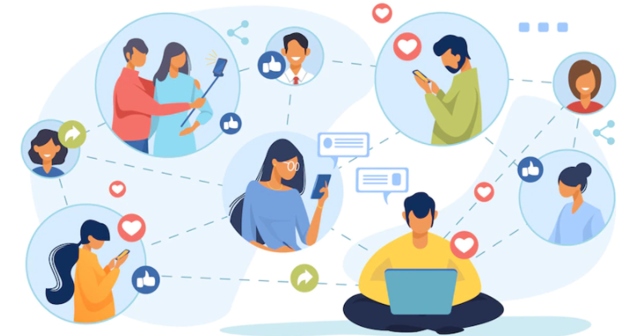Marketing is shifting towards a more personal approach as the customer is no more a faceless entity. Peer-to-Peer (P2P) marketing is gradually taking center stage of marketing as an effective technique to reach out to potential customers.
A recent study shows that around 70 percent of millennials make their buying decisions influenced by other people’s advice, and 30 percent of consumers are more likely to make their buying decisions influenced by a non-celebrity blogger. Thus, P2P contributes around 20-50 percent of purchasing decisions.
Modern businesses have realized the potential of P2P marketing and are taking their marketing initiatives built around P2P advertising for a competitive edge.
What Is P2P Marketing?

P2P marketing is a marketing technique where a brand’s existing customer recommends the brand and its products to the people in their social network. The P2P promotion campaign gets built on relationships and trust.
Over the period, a brand develops trust among its existing customers. This trust among the existing customers drives them to act as advocates of the brand and its products and recommend them to peers. Nowadays, before making buying decisions, people trust and prefer to seek feedback and recommendations from product users.
Research shows that in the B2C segment, 82% of consumers proactively seek referrals from peers before making a purchase. And 92 percent of people accepted that they get influenced by their peers while making a purchase.
Organizations can use the voice of their customers to communicate their product advantage to the target group. According to a report by Heinz marketing, companies with formalized referral marketing observed 86% growth in their revenue compared to organizations that don’t follow referral marketing or P2P marketing.
How All Marketing Ideas Are Built on P2P Strategy

In this digital and hyper-connected world, businesses cannot operate and evolve in solidarity. The world is globally connected and getting more social and vocal than 30 years before. Radio took 30 years to influence and reach 50 million audiences, whereas Facebook made 100 million users in just nine months. It shows how people reward relevance, personalization, and good customer experience.
Modern marketing strategies are built on P2P advertising to remain at the forefront and meet their sales target. Let’s look at a few marketing strategies and how they evolve around P2P advertising.
B2B Marketing
The world of B2-B marketing is expanding, and the behavior of professional service buyers has changed. B2B professionals now connect with their peers and colleagues using social media platforms, networking events, professional forums, etc., for a more personal approach.
Organizations like IBM has found social business as the new norm people prefer to do business and learn about the products from their peer instead of companies. They are looking for a face and name that can guide them, who have directly worked with the product and has the appropriate answers to resolve their queries.
B2C Marketing
The goal of any B2C marketing campaign is to convince people to buy their products. And marketing is about building trust and relevancy. For instance, while selecting a mobile brand to purchase a smartphone, we place more weight on what a peer or relative recommends rather than what a brand says. We trust our peers and relatives, their experience, and unbiased opinion.
Brands are creating their marketing strategies based on P2P advertising, such as asking them to share or recommend the brand and its product to friends on social groups and return lucrative offers. Using micro-influencers, launching a referral program in the app or website, sending emails to customers asking them to bring a friend, etc., are other examples of how brands use P2P advertising.
Account-Based Marketing
Account-based marketing (ABM) narrows down the spectrum of customers into a smaller subset of leads by identifying and targeting a specific group that organizations want to convert.
A successful ABM strategy requires a personalized and custom-fit approach that is effective for the targeted customer. For example, GumGum’s personalized ABM marketing effort helped it make T-Mobile its client. The online presence of T-Mobile CEO John Legere helped GumGum visualize his sense of personality and dislike and customize their marketing efforts accordingly, just as in P2P marketing.
Product-Led Marketing
Product-led growth marketing uses the product as the key channel for marketing. Customers want to try a product before purchase, and PLM is not just about trying before you buy but also shows how the product can generate demand.
Giving a free trial to prospects helps them experience and evaluate the product and recommend it further to their peers. The product inspires virality, minimizes customer acquisition costs, and increases profit margin.
Reasons Why P2P Marketing Leads the Business to Success

Depending on a brand and business goals, P2P marketing can take different forms to target customers based on personalization and relationship. P2P advertising techniques brings numerous benefits to business that leads to positive ROI and growth.
Personalized Marketing
The product that motivates a person in his thirties is different from the one of sixty years. P2P marketing differentiates and understands the need for separate customer segments and creates content unique to a particular customer segment. Thus, a personalized marketing strategy delivers an effective result.
Showcase a Business Personality
P2P marketing helps showcase a business personality with unique and credible content. The creative and customized content engages customers and presents the actual brand personality.
Direct Interaction of Customers
The advent of technology and social platforms like Facebook, LinkedIn, Twitter, and Instagram helps consumers across their voices and opinions. It gives a more human touch to the brand and increases the trust and credibility among consumers for the brand.
Builds Long-term Relationships With Customers
P2P advertising builds a long-term relationship with customers. Customers can directly interact with the brands and get valued as individuals who can give their comments and opinions. It helps establish a long-term relationship.
P2P Marketing as the New Marketing Norm
Businesses are looking for a more personal approach to attract and engage their customers, and people prefer to learn and trust their peers and friends about a product. All marketing strategies are gradually built around peer-to-peer advertising to scale their business and develop long-term relationships with their customers. Content Inception (CI) is a digital marketing service provider that deeply understands the impact and value of P2P marketing. CI supports organizations in building long-term relationships with their customers through its vast digital marketing services in the spaces of both B2B and B2C.


















